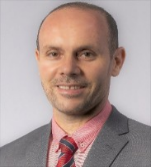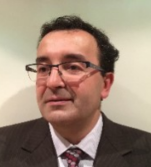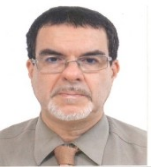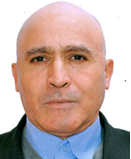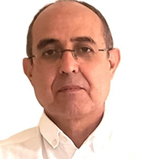
|
|
|
Plenary Speakers
Prof. Saad MEKHILEF The Role of Technology in Achieving a Modern Carbon-Neutral Society Abstract - The global energy system is transitioning significantly to become carbon-neutral. The energy generation will be from renewables, and electricity will carry more energy. Power electronics (PE) is an application-oriented and interdisciplinary area. It uses power semiconductor devices to perform switching actions to achieve the desired conversion strategy. The PE plays a crucial role in converting and controlling electrical power. The effective use of electrical energy is a vital technique for achieving energy efficiency, and power electronics technologies that can convert electric power into the optimum characteristics for each application are an essential part of this approach. Power electronics systems have attracted attention as critical components for building a sustainable energy supply. PE-based power converters are also widely used in conventional and renewable energy systems. The presentation will discuss the power electronics technology, where it is applied, and the main future challenges for the technology in creating a carbon-neutral society that is believed to be dominantly electrical-based. Biography - Prof. Dr. Saad Mekhilef is an IEEE and IET Fellow. He is a Distinguished Professor at the School of Engineering, Swinburne University of Technology, Melbourne, Australia, an Honorary Professor at the Department of Electrical Engineering, University of Malaya, and a distinguished visiting professor at the Institute of Sustainable Energy, University Tenaga Nasional, Malaysia. He authored and co-authored more than 800 publications in academic journals and proceedings, five books with more than 64,000 citations, and more than 85 Ph.D. students who graduated under his supervision. He serves as an editorial board member for many top journals, such as IEEE Transactions on Power Electronics, IEEE Open Journal of Industrial Electronics, IET Renewable Power Generation, E-Prime, Journal of Power Electronics, and International Journal of Circuit Theory and Applications.
Prof. Noureddine TAKORABET On the Electrification of Road Transport: An Overview of Recent Developments in Electric and Hybrid Vehicles Abstract - Combustion vehicles are a major source of air pollution in large cities. The electrification of transportation modes is a way to reduce this pollution for the benefit of all. Driven by political authorities, industry leaders, and the scientific community, hybrid and electric vehicles have undergone significant developments in recent decades. Hybridization architecture, electromechanical conversion chains, storage methods, and battery charging systems are some of the key aspects that have seen significant developments, which we will attempt to address during this seminar.
Prof. Youcef CHIBANI From Biological Neuron to Embedded Neuron: The Fascinating or Dangerous Adventure Abstract - Inspired by the biological neuron, artificial neural networks have evolved from the early perceptron to today’s deep learning architectures such as CNNs, autoencoders, and large language models. These systems now power applications in vision, language, and autonomous decision-making with remarkable accuracy. A new frontier is emerging: embedding these models into low-power edge devices like the ESP32-S3, enabling real-time AI in smart appliances, predictive maintenance, and autonomous agriculture.This talk revisits the foundational models and traces their journey toward embedded intelligence, highlighting both technological breakthroughs and ethical questions. Are we building sustainable, transparent systems — or risking opaque decision-making at the edge? Join us in exploring the promises and pitfalls of this neural revolution.
Prof. Hocine MOULAI Techniques for Electrical Discharge Generation, Measurement, and EMC Protection Abstract - Electrical discharges are a major cause of insulation degradation in power equipment and can lead to failures in transmission and distribution networks. Early detection is therefore essential, along with continuous monitoring of discharge characteristics such as intensity and occurrence frequency. Electrical discharges can be identified through voltage and current measurements, as well as through the detection of associated magnetic fields, light, and acoustic emissions. Each diagnostic method offers specific advantages and limitations. This presentation will review different experimental setups developed for high-voltage generation and measurement in DC, AC, and impulse modes. Particular attention will be given to the use of Faraday cages, shielding techniques, and protection methods to ensure reliable signal acquisition in the presence of strong electromagnetic fields.
Prof. Abdallah MEDJDOUB Power system stability in the era of renewable energy: Abstract - The 2030 Agenda for Sustainable Development is a universal plan of action adopted by all 193 United Nations Member States in September 2015. Its primary mission is to end poverty, protect the planet, and ensure that all people enjoy peace and prosperity by the year 2030. This Agenda includes 17 Sustainable Development Goals (SDG), with ‘‘Affordable and Clean Energy’’ constituting SDG No. 7. This aims to ensure access to affordable, reliable, sustainable, and modern energy for all. While the integration of renewable energy sources (RES) is essential for a sustainable energy future, grid expansion continues to lag behind the rapid growth of renewable energy sources. Due to their variable and intermittent nature, and non-synchronous generation, their integration into power systems presents significant challenges in maintaining system stability. The presentation will discuss the various stability challenges that arise from the high-level penetration of renewable energy, including critical issues related to system inertia, frequency regulation, voltage control, and rotor angle stability. A comprehensive suite of technological and operational solutions is examined to mitigate these challenges.
|
